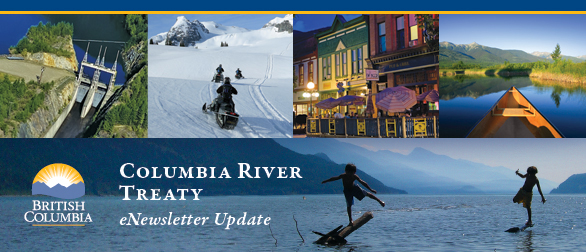Columbia River Treaty
Edition:

Communicating B.C.'s Perspective to U.S. Stakeholders
The Columbia River Treaty Review team was busy during August, September and October presenting information on the British Columbia (B.C.) Columbia River Treaty review process at several venues in the United States (U.S.).
On August 15th, in Seattle Washington, the Northwest Power and Conservation Council (http://www.nwcouncil.org) invited Treaty Review staff to participate in a panel on the Columbia River Treaty as part of the 2012 Congressional Staff Tour. Tour participants included Idaho, Montana, Oregon and Washington congressional staff from Washington D.C. covering fisheries, public affairs, legal and executive portfolios. B.C. provided an update on the Treaty review process, studies being conducted, public and First Nations consultation processes as well as some of B.C.’s preliminary perspectives on the Treaty. Representatives from Bonneville Power Administration, Columbia River Intertribal Fisheries Commission and Upper Columbia United Tribes also made presentations. Audience questions focused on how to balance the many interests in the Columbia Basin.
The next opportunity to present was on August 21 at the Legislative Council on River Governance in Boise, Idaho. The Council is made up of state senators and house representatives from Idaho, Montana, Washington and Oregon and meets regularly to discuss a broad range of policy issues (see meeting agenda: http://www.legislature.idaho.gov/sessioninfo/2012/interim/river0813.pdf ). B.C. Treaty Review staff provided background information on key provisions of the Treaty and updates on the Treaty Review process, key issues emerging from public and First Nations consultations to date, and B.C.’s initial perspectives on the future of the Columbia River Treaty. Some of the topics covered during the Council sessions were water quality standards, meeting U.S. Endangered Species Act requirements, public engagement and role of the states in the U.S. Treaty review process, the cost of the Canadian Entitlement and integration of wind power into a predominantly hydroelectric system.
On September 11-13 in Ellensburg, Washington, B.C. Treaty Review staff participated in the American Water Resource Association Conference (Washington section). The conference covered a wide range of water-related topics: the Columbia River Treaty (of course!), tributary headwaters management, a global perspective on dams, socio-cultural impacts, hydropower and local government perspectives, climate change, agriculture, water management and fisheries as well as other topics. View the agenda and presentations at: http://waawra.org/Events/Conference2012.
Finally, on October 10-12, B.C., Canada and the U.S. presented updates on their respective Treaty review processes at the 4th Annual Symposium on Columbia River Governance in Polson, Montana (http://www.columbiarivergovernance.org/4thAnnualSymposium.html). The symposium is hosted by the Universities Consortium on Columbia River Governance. The Consortium is made up of faculty from public universities within the Columbia River Basin and was created in 2008 to offer a nonpartisan platform to facilitate an informed, inclusive, international dialogue among key decision-makers and other interested people and organizations. A strong focus at this year’s symposium was on aboriginal interests and engagement. Key discussion topics covered the respective roles of Canada and British Columbia in the Treaty review process, aboriginal rights and interests, ecosystem values, legal options and cooperative arrangements, and common interests, benefits and trade-offs. The symposium closed off with reflections from Tribal and First Nations leaders. The outcome of the symposium will be the drafting of Statement of Principles that will inform stakeholders and decision makers on the future of the Columbia River Treaty.
At all the venues, audiences appreciated hearing about provincial processes and perspectives directly from the B.C. Treaty Review team, and having an opportunity for dialogue and to ask questions.
If you have any questions about any of these presentations, please feel free to contact Kathy Eichenberger at 250 953-3368 or Kathy.Eichenberger@gov.bc.ca

